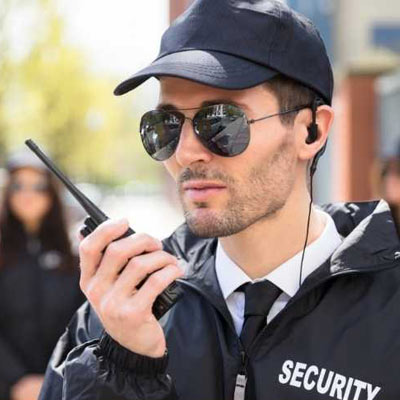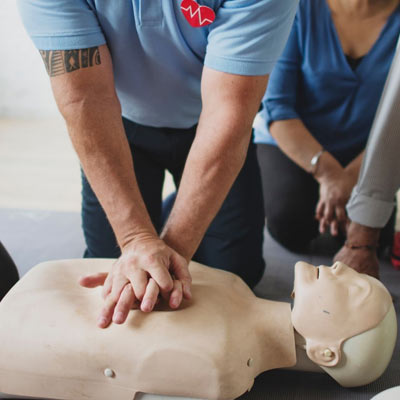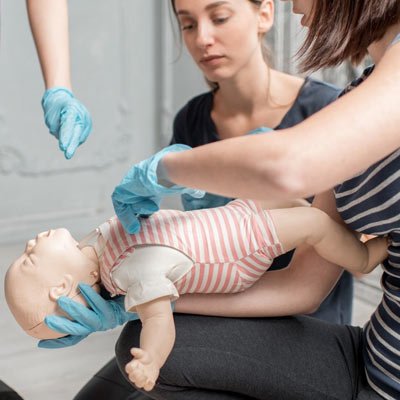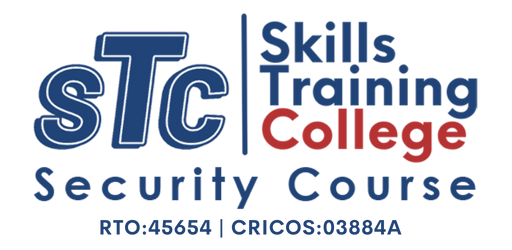FREE INFO SESSION
Our Other Courses

Security Operations
CPP20218 Certificate II in Security Operations

Provide CPR Course
HLTAID009 Provide CPR

Provide First Aid Course
HLTAID011 Provide First Aid

RSA Course
SITHFAB002 Provide Responsible Service of Alcohol

RSG Course
SITHGAM001 Provide Responsible Gambling Services
Secure your future by completing a Security Course
Become a Security Guard, Crowd Controller, and more, by completing a Security Operations course with Skills Training College.
In addition, the CPP20218 Certificate II in Security Operations serves as a gateway to further training for more specialised professional security roles, such as:
- Armed guard
- Cash-in-transit
- Close personal protection
- Operations in control rooms
- Handling guard dogs
Skills Training College’s CPP20218 Certificate II in Security Operations is accredited throughout Australia. However, licensing requirements vary from state to state, so it’s always worth checking your region’s local security licensing regulations. For more details, you can contact us.

CPP20218 Certificate II in Security Operations
The CPP20218 Certificate II in Security Operations qualification provides you with the skills and accreditation you need to work in the security industry as a non-armed security guard or crowd controller. It will give you the skills to manage the security and safety of others in a variety of circumstances, including guarding and patrolling a privately owned property. You’ll also be qualified to provide security at a licenced venue, including tasks such as screening customers on entry, monitoring the behaviour of patrons, and escorting people off the premises when required.
Completion of the CPP20218 Certificate II in Security Operations can also unlock the following more specialised avenues of security training*:
- CPP31318 Certificate III in Security Operations
- CPP31418 Certificate III in Close Protection Operations
- Cash in Transit
- Security K9 Handler Course
- CPP20319 Certificate II in Technical Security
- CPP30519 Certificate III in Technical Security
- CPP41519 Certificate IV in Security and Risk Management
* Please take note that these training modules are not yet available through Skills Training College as accredited training courses.
Start your security career with Skills Training College
Whether you’re local or an overseas student, Skills Training College can help you get started in the security industry with nationally accredited training.
We have courses for not just security work, but also for careers in the hospitality, health and construction industries. Our course format is designed to be highly flexible to meet the needs of all our students. Have a look below to see some of the various courses available through Skills Training College.
Start Training with Skills Training College now! STC (formerly known as National Training College) provides accredited training for both locals and overseas students all over Australia. We have approved courses for the health, construction and hospitality industries. All training is designed with a flexible approach to ensure the specific training needs of all our learners are met effectively and efficiently.
Learn More About our Courses
Security Courses – FAQ’s
If you don’t find the answer you are looking for, please don’t hesitate to contact us.
Do you provide training to international students?
Yes. Skills Training College is registered with CRICOS and fully accredited to offer training to international students.
Am I able to complete my Security Training online
Unfortunately, no. Currently, all training courses in the security industry have a required number of face-to-face hours – so some contact time with a trainer is required.
What sort of jobs will security training open the door to?
Completing a security course with Skills Training College can act as an entry point into a wide variety of entry-level security roles.
Is my Security Licence valid throughout Australia?
The security licence you obtained in one state is valid only within that particular territory. To work as a guard, for example, in Tasmania you would need to apply for security licence from the Tasmanian government.
How frequently do I need to renew my licence/qualification
The Private Security Licence is valid for three years, and two months before it expires you will be sent a renewal notice. If your licence lapses, then you must submit an application with additional training if needed.
What are the minimum and maximum age requirements for Security Courses?
You can begin the course at 17, but you need to be 18 years old in order for an application for a security license. There is no maximum age limit when it comes to this course.
I have completed a Security Course a while ago. Do I need to take it again?
Once the course is completed, certificates are valid for 12 months. If you have undertaken a security course more than 12 months ago and find your training to be out of date, or if some units in your current training are no longer relevant, then there may be a credit transfer available for those Units.
My license has expired. What do I need to do now?
If you have allowed your licence to expire, you will need to reapply for a new one rather than renew it. This may mean that you will need to redo or refresh parts of your training and that you might be eligible for credit transfer (for any units still current) at this stage. To make sure there are no errors in the assessment process we can perform on whether or not there is anything left undone, please bring all Statements of Attainment with the most recent date into our head office in city and speak with one of our Enrolment Officers about what needs done.
Can you tell me how much security course certification will cost?
The complete CPP20218 Certificate II in Security Operations course is only $1500, including all training resources and equipment.
This price can be even lower when our daily deals are in effect. And of course, if you find the same course on offer elsewhere for a lower price, talk to us, and we’ll match it!
Can I choose where to do security course training?
Skills Training College offers our CPP20218 Certificate II in Security Operations training from various locations around Australia. We have training venues in most capital cities and many regional centres. If you’re looking to do Security Training, why not get in touch with us to choose which training venue is best suited to your schedule?
Is a security course hard to do?
The CPP20218 course has no requirements for previous training, so it’s open to people of any educational background and designed to be as accessible and understandable as possible. But it is a comprehensive course that covers a lot of material over several weeks – so it does require some commitment to complete.
How can I tell which security course is best?
The Certificate II in Security Operations is actually defined by the government (more specifically, by the National Register on Vocational Education and Training). So the difference between training organisations comes down to things like facilities, customer service, and trainer experience. And with a 4.5 / 5 on Google reviews and a 94% approval on arrivala.com, you can be confident that Skills Training College offers one of the best training experiences on the market.
What is security course training going to teach me?
The CPP20218 training covers various topics in its core units, including crowd control, escorting people off a premises, emergency situations, first aid, legal requirements of security, and risk management. You can read more specifics on the course syllabus on the training.gov.au website.
Is there a security course near me?
If you’re in any Australian capital city and many regional centres, you should have a Skills Training College training venue somewhere near you (possibly under a different local name). Why not contact us to enquire about the nearest venue?
Can I do a security course with job prospects?
A Certificate II in Security Operations is both a valuable qualification on its own AND a stepping stone to more specialised security roles – including armed guards, bodyguards, cash-in-transit roles, and investigative services.
